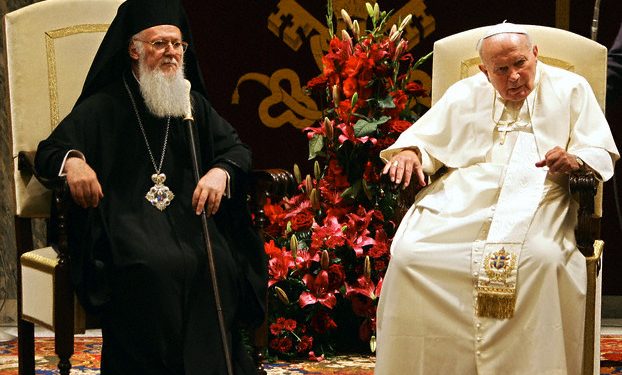The Filioque Controversy

“Filoque” is Latin for “and the Son” and refers to the part of the Nicene Creed wherein Christians declare the Holy Spirit “proceeds from the Father and the Son.” The Orthodox—along with Eastern Catholic Churches—do not recite this part of the Creed. More important for our purpose, many among the Orthodox reject the theology of the filioque as well. This, of course, is where the problem starts.
The objections from the Orthodox can basically be broken down into three categories. First, the claim is made that the filioque is a novelty of the ninth century that contradicted the original and definitive Nicene Creed as it was declared by the Council of Constantinople (AD 381). Second, it is claimed, the filioque denies the Father as the first “principle” (Greek, arche) or “source” of the life of the Godhead, and in so doing contradicts a constitutive element of the nature of the Blessed Trinity. And thirdly, it is believed to contradict the plain words of Jesus in John 15:26:
But when the Counselor comes … even the Spirit of truth, who proceeds from the Father, he will bear witness to me.
Jesus here declares the Holy Spirit proceeds from the Father, not from the Father and the Son.
The Catholic Answer:
The Catholic Church has always acknowledged the Creed of I Constantinople (AD 381) since Pope St. Leo I ratified both the Council and the Symbol (the Creed) in AD 451. The addition of the filioque is a development of the Creed that in no way contradicts the earlier version any more than the development and subsequent change of the Creed between the time of the Council of Nicea (AD 325) and I Constantinople represented a corruption of the Creed then. Moreover, the Catholic Church actually agrees with the Orthodox that the Father is the first origin of the divine life of the Trinity. CCC 245-248 explains:
The apostolic faith concerning the Spirit was confessed by the second ecumenical council at Constantinople (381): “We believe in the Holy Spirit, the Lord and giver of life, who proceeds from the Father.” By this confession, the Church recognizes the Father as “the source and origin of the whole divinity”. But the eternal origin of the Spirit is not unconnected with the Son’s origin… he is not called the Spirit of the Father alone,… but the Spirit of both the Father and the Son…
The Council of Florence in 1438 explains: “The Holy Spirit is eternally from Father and Son; He has his nature and subsistence at once (simul) from the Father and the Son [filioque]. He proceeds eternally from both as from one principle and through one spiration. . . .
The affirmation of the filioque does not appear in the Creed confessed in 381 at Constantinople. But Pope St. Leo I, following an ancient Latin and Alexandrian tradition, had already confessed it dogmatically in 447 (Quam Laudabiliter) even before Rome, in 451 at the Council of Chalcedon, came to recognize and receive the Symbol of 381. The use of this formula in the Creed was gradually admitted into the Latin liturgy (between the eighth and eleventh centuries)…
At the outset the Eastern tradition expresses the Father’s character as first origin of the Spirit… The Western tradition expresses first the consubstantial communion between Father and Son, by saying that the Spirit proceeds from the Father and the Son (filioque)… This legitimate complementarity, provided it does not become rigid, does not affect the identity of faith in the reality of the same mystery confessed.
A Protestant-Orthodox Parallel
Some among the Orthodox who are “rigid” on this point are reminiscent of Protestants who cling to verses of Scripture that say justification is “by faith” while refusing to acknowledge other texts that just as clearly say justification involves “works,” or “obedience,” “perseverance,” etc. They are right when they say justification is by faith; they are wrong when they insist upon a “faith alone” that excludes works as being part of the process of justification in any sense.
The Catholic Church could allow for a belief in “faith alone” as long as it would not place hope and charity in opposition to faith, and as long as it would teach perseverance in that faith, hope, and charity—in good works performed in Christ—as necessary for final justification or salvation. A “faith alone” theology, for example, that places faith in opposition to works done apart from Christ, or before entering into Christ, would not contradict the Catholic Faith.
Analogously, the Orthodox are right when they insist the Holy Spirit proceeds from the Father as first principle of the divine life of the Trinity, and the Catholic Church has always agreed. They are wrong if they, along with the originators of the schism, create the novelty of ek tou monou tou Patrou, which is Greek for “from the Father alone” in that “rigid” sense contrary to the ancient theological understanding of both the Creed and our Trinitarian theology in both the East and West. Similar to the Protestant controversy concerning sola fide, the Church would not even have a problem with ek tou monou tou Patrou as long as that phrase would not be interpreted as denying the Son’s essential role in the procession of the Person of the Holy Spirit. More on that below:
One way to aid in understanding the filioque is to think about the eternal relations within the Godhead that constitute the persons of the Trinity as an eternal and intimate dialogue of love. The Second Person of the Blessed Trinity is referred to in John 1:1 as “the Word” of the Father who is therefore “generated” by the Father (John 1:18), and yet he is also revealed to have been “with” the Father enjoying this eternal and loving “dialogue,” or communion of persons, from all eternity in John 17:5. The Holy Spirit is that dialogue or communion of love between the Father and Son that is so perfect and infinite that “it” constitutes another person; “it” becomes a “he.” It is the Father who initiates the “dialogue” as “first origin” of life and love in the Godhead. But without the Son, there is no dialogue. Thus, without both the Father and the Son there is no procession of the Person of the Holy Spirit; The Holy Spirit proceeds as the fruit of this loving communion between the Father and the Son, initiated by the Father alone.
The Eastern concept of the Holy Spirit proceeding from the Father through the Son is another legitimate way of getting at the idea of the Son’s essential involvement in the procession of the Holy Spirit. In fact, there are some among Orthodox leaders who today acknowledge the essential agreement between Catholics and the Orthodox. Eastern Orthodox Bishop Kallistos Ware is one of these. He has actually changed his mind on the matter:
Qualifying the firm position taken when I wrote [my book] The Orthodox Church twenty years ago, I now believe, after further study, that the problem is more in the area of semantics and different emphases than in any basic doctrinal differences (Speech to a Symposium on the Trinity: Rose Hill College, Aiken, South Carolina, May, 1995).
What Does the Bible Say?
John 14:26:
But the Counselor, the Holy Spirit, whom the Father will send in my name, he will teach you all things…
John 15:26:
But when the Counselor comes, whom I shall send to you from the Father, even the Spirit of truth, who proceeds from the Father, he will bear witness to me.
The Father “sends” the Holy Spirit? And you even have the very words of our Lord stating the Holy Spirit “proceeds from the Father.” No doubt a surface reading of these texts seems to contradict the Catholic position. But we must be careful not to lift texts out of context and absolutize them.
As I said above, the Catholic Church agrees that the Holy Spirit proceeds from the Father. She objects to a “rigid” version of “proceeds from the Father alone.” The Holy Spirit is sent by and proceeds from the Father to be sure. But notice, in John 15:26, Jesus says he will “send” the Holy Spirit just as he also says the Holy Spirit “proceeds from the Father.” Moreover, in John 16:7, Jesus goes on to say:
Nevertheless I tell you the truth: it is to your advantage that I go away, for if I go not away, the Counselor will not come to you; but if I go, I will send him to you (emphasis added).
And as the Catechism of the Catholic Church points out in paragraph 1137:
… finally it (referring to Rev. 22:1) presents “the river of the water of life… flowing from the throne of God and of the Lamb,” one of the most beautiful symbols of the Holy Spirit.
Indeed, the Bible is very plain in Revelation 22:1:
Then he showed me the river of the water of life, bright as crystal, flowing from the throne of God and of the lamb…
Here we have the Holy Spirit proceeding from the Father and the Son. The Catechism also references Rev. 21:6 and John 4:10-14, which make very clear that this “water of life” is a reference to the Holy Spirit. If you also add John 7:37-39 recalling that it was St. John who wrote both John’s gospel and the book of Revelation under the inspiration of the Holy Spirit, there can be no doubt what—or who—this “water of life” refers to as proceeding from the Father and the Son:
… “If any one thirst, let him come to me and drink. He who believes in me as the Scripture has said, “Out of his heart shall flow rivers of living water.” Now this he said about the Spirit…
A Matter of Semantics
In the final analysis, the words of Cool Hand Luke come to mind when we consider the filioque controversy: “What we have here is a failure to communicate.” From the outset of the controversy in the ninth century, a large portion of the problem has been the failure of Greek and Latin minds to understand each other. Let me explain:
When the Greeks spoke of the “procession” of the Holy Spirit, they had in mind the Greek word, ekporeusis, the term, in fact, used in John 15:26 cited above, when Jesus said the Holy Spirit “proceeds from the Father.” This term refers to the essential and “first” origin of the Holy Spirit, which the Greeks are right, is from the Father alone. It is the teaching of all Christians, East and West, that the Father is the soul monarch, or source (Gr. arche) of the entire Godhead. Greek has another term, proienai, which is used among the Greek fathers for the Son’s role involving not the “first” origin of the Holy Spirit; rather, the procession of the Person of the Holy Spirit from the Father and the Son that in no way denies the Father as first principle of life on the Godhead.
Unfortunately, the Latins used procedit (“proceeds”) from the Vulgate translation of John 15:26 that has a more general meaning that can incorporate either ekporeusis or proienai in Greek. The Latins emphasized a meaning akin to proienai.
Thus, the Latins never intended to deny the sole monarchy of the Father, while some in the East seemed not to be able to understand the Western concept of “procedit.”
Add to this the problem of the Greek word arche (“beginning,” or “source”) translated into Latin as principio (“beginning,” or “principle”) and we have more trouble. For the Greeks, there cannot be two “sources” or “causes” (arche) of the divine life of God. And the Latin fathers agree. But following St. Augustine, the Latin fathers and theologians would speak of the Father as Principium Impricipatum (an “unbegun beginning”) and the Son as Principium Principiatum (a “begun beginning”) allowing them to harmonize the truth that both the Father and the Son are the single principle (principio) of the procession of the Person of the Holy Spirit while never denying the uniqueness of the Father as “principle without principle.”
The Holy Spirit proceeds from the Father as principle, and, through the latter’s timeless gift to the Son, from the Father and the Son in communion (St. Augustine, De Trinitate, XV, 25, 47).
To the Greek “a begun beginning” made no sense (welcome to the mystery!). And for some, this was tantamount to the creation of two Gods; hence, they went so far as to declare Catholic baptisms invalid!
This quickly became much more than semantics!
The key, I think, to understanding between East and West is to understand the Holy Spirit to proceed ek monou tou patrou because the Father is the true arche (source) of the entire life of the Trinity. The Greeks are right here. It is only when we speak of the procession (proienai) of the Person of the Holy Spirit “after” the initiation of the divine life that alone belongs to the Father that we can speak of the Holy Spirit proceeding from the Father and the Son (filioque). The Latins are correct as well.
Ask the Fathers – They Know
Far from rejecting the theology of the filioque, many fathers of the Church—both East and West—clearly taught it. In the West, we have Tertullian, St. Hilary of Poitiers, St. Ambrose, and St. Augustine, all teaching the theology of the filioque anywhere from 600 to 800+ years before the final Orthodox schism in AD 1054. These fathers are clearly “Catholic” in their understanding.
Most importantly for our Orthodox friends, many Eastern fathers taught the filioque as well. For example, we have Didymus the Blind (The Holy Spirit, 37: AD 380). He is an Eastern father and was head of the famous Catechetical School of Alexandria. He was blind from the age of four, yet absolutely brilliant. He was one of St. Jerome’s teachers and, in fact, St. Jerome accused St. Ambrose of plagiarism because he used Didymus’ work so extensively in his own work titled, On the Holy Spirit, where St. Ambrose teaches the filioque as well. Could this be a case of an ancient Eastern father teaching a Western father the theology of the filioque? Perhaps. But most importantly, listen to the clear words of Didymus:
“Of mine he shall receive.” (Quoting John 16:15) Just as we have understood discussions, therefore, about the incorporeal natures, so too it is now to be recognized that the Holy Spirit receives from the Son that which He was of His own nature, and not as one substance giving and another receiving, but as signifying one substance. So too the Son is said to receive from the Father the very things given Him by the Father, nor has the Holy Spirit any other substance than that given Him by the Son. And on that account we do affirm those propositions according to which we believe that in the Trinity the nature of the Holy Spirit is the same as that of the Father and the Son.
We also have St. Epiphanius of Salamis (The Man Well-Anchored, 8; 75 AD 374). He is another Eastern Father who taught the theology of the filioque. St. Jerome called him “a pentaglot” because of his thorough knowledge of Greek, Hebrew, Syriac, Coptic and Latin. He was Bishop of modern Salamis, then Cyprus at Constantia:
For the Only-begotten Himself calls [the Holy Spirit] “the Spirit of the Father,” and says of Him that “He proceeds from the Father,” and “will receive of mine,” so that He is reckoned as not being foreign to the Father nor to the Son, but is of their same substance, of the same Godhead; He is Spirit divine… of God, and He is God. For He is Spirit of God, Spirit of the Father, and Spirit of the Son, not by some kind of synthesis, like soul and body in us, but in the midst of Father and Son, of the Father and of the Son, a third by appellation…
The Father always existed and the Son always existed, and the Spirit breathes from the Father and the Son; and neither is the Son created nor is the Spirit created…
St. Cyril of Alexandria (Treasury of the Holy and Consubstantial Trinity, Thesis 34, AD 425), another Eastern Father, says perhaps even more plainly:
Since the Holy Spirit when He is in us effects our being conformed to God, and He actually proceeds from Father and Son, it is abundantly clear that he is of the divine essence, in it of essence and proceeding from it.
There are many more fathers we could cite, but our conclusion here should be apparent: From an historical perspective, a “rigid” Orthodox position is untenable. To say that these great fathers of the Church representing both East and West were all wrong would be unwise at the very least.
Genitive of Relation (or “Origin”)
One important way Scripture reveals the “origin” of the Holy Spirit is when it refers to the Holy Spirit as “the Spirit of the Father.” Consider Matthew 10:19-20:
When they deliver you up, do not be anxious how you are to speak or what you are to say; for what you are to say will be given to you in that hour; for it is not you who speak, but the Spirit of your Father speaking through you.
This phrase “the Spirit of your Father” uses a very common linguistic tool in Greek grammar: “the genitive of relation.” Another example of this usage is found in Luke 6 in the listing of the apostles multiple times in order to identify the father of some of the apostles. We’ll just look at one example here from Luke 6:15. Notice, St. James is referred to as “James of Alphaeus.” This is another case of “the genitive of relation” revealing Alphaeus to be James’s father. In the same way, and in many places in Scripture, the Holy Spirit is also shown to have His origin not only from the Father, but also from the Son.
But you are not in the flesh, you are in the Spirit, if the Spirit of God really dwells in you. Anyone who does not have the Spirit of Christ does not belong to him (Romans 8:9).
The prophets who prophesied of the grace that was to be yours searched and inquired about this salvation; they inquired what person or time was indicated by the Spirit of Christ within them when predicting the sufferings of Christ and the subsequent glory (I Peter 1:10-11).
Notice, in Romans 8:9, “the Spirit of God (the Father)” is then referred to as “the Spirit of Christ” in the same verse! There can hardly be a doubt, biblically speaking, that the Holy Spirit proceeds from the Father and the Son.






